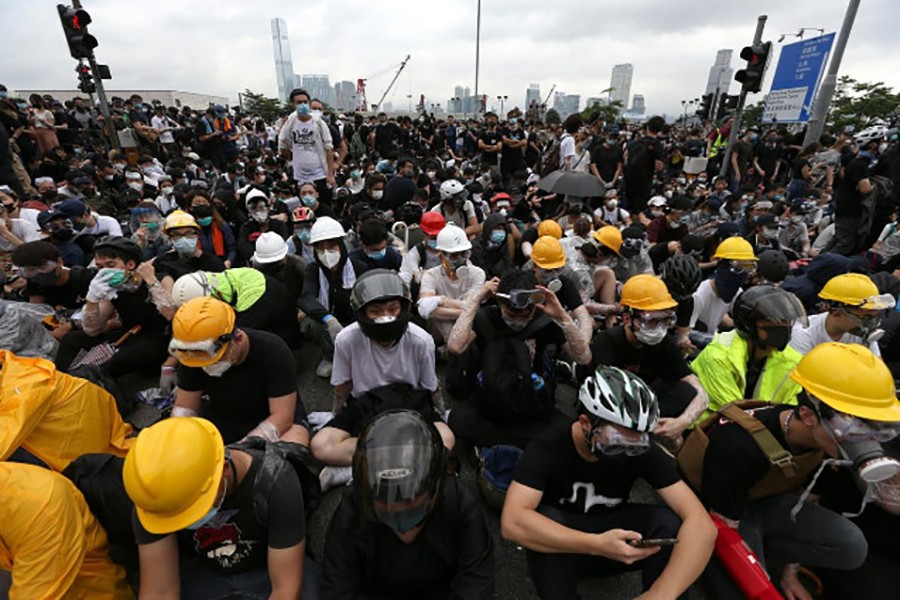Tens of thousands of demonstrators in Hong Kong surrounded the city’s legislature on Wednesday, forcing it to postpone a second round of debate on an extradition bill that would allow people to be sent to mainland China for trial.
The protesters, most of them young people dressed in black, erected barricades as they prepared to hunker down for an extended occupation of the area, in scenes reminiscent of pro-democracy “Occupy” protests that rocked the city in 2014.
Protesters rallied in and around Lung Wo Road, a main east-west artery near the offices of embattled Hong Kong Chief Executive Carrie Lam, as hundreds of riot police warned them to stop advancing.
“We won’t leave till they scrap the law,” said one young man wearing a black mask and gloves.
“Carrie Lam has underestimated us. We Won’t let her get away with this.”
Lam has vowed to press ahead with the legislation despite deep concerns in the Asian financial hub, including among business leaders, that it could undermine freedoms and investor confidence, and erode its competitive advantages.
Opposition to the bill on Sunday triggered Hong Kong’s biggest political demonstration since its handover from British to Chinese rule in 1997 under a deal guaranteeing it special autonomy.
The government said debate on the bill that was due to take place in the city’s 70-seat Legislative Council would be delayed until further notice.
The legislature is controlled by a pro-Beijing majority.
Many of the protesters defied police calls to retreat and passed provisions, including medical supplies, goggles, water and food among each other.
Some stockpiled bricks broken away from pavements.
The demonstrators rallied just a stone’s throw from the heart of the financial center where glittering skyscrapers house the offices of some of the world’s biggest companies, including HSBC.
HSBC and Standard Chartered, in addition to the Big Four accounting firms, had all agreed to flexible work arrangements for staff on Wednesday, Hong Kong media reported.
Standard Chartered and Bank of East Asia suspended operations at some branches in the area.
The government advised staff to avoid driving to government buildings because roads were blocked as protesters vented their anger and frustration over a proposed law that has generated unusually broad opposition at home and abroad.
Lam Defiant
Demonstrators from across a wide spectrum of Hong Kong society began joining overnight protests earlier on Wednesday as businesses across the city prepared to go on strike.
Lam has sought to soothe public concerns and said her administration was creating additional amendments to the bill, including safeguarding human rights.
Sunday’s protest, which organizers said saw more than a million people take to the streets, in addition to a snowballing backlash against the extradition bill, could raise questions about Lam’s ability to govern effectively.
The protests have plunged Hong Kong into political crisis, just as the 2014 demonstrations did, heaping pressure on Lam’s administration and her official backers in Beijing.
Opposition lawmaker Hui Chi-fung said he did not expect a repeat of the 2014 protests that highlighted anger in Hong Kong toward what many people in the city see as increasing efforts by Beijing to control the city and stifle its democracy.
“I don’t consider today’s protest an Occupy movement,” Hui said. “Young people here in the crowd are here only to voice out their anger at the government forcing to pass the extradition bill.”
Britain handed Hong Kong back to China 22 years ago under a “one-country, two-systems” formula, with guarantees that its autonomy and freedoms, including an independent justice system, would be protected.
However, many accuse China of extensive meddling since then, including obstruction of democratic reforms, interference with local elections and of being behind the disappearance of five Hong Kong-based booksellers, starting in 2015, who specialized in works critical of Chinese leaders.
Beijing rejects those accusations and official Chinese media said this week “foreign forces” were trying to damage China by creating chaos over the extradition bill.
A spokesman for bourse operator Hong Kong Exchanges and Clearing (HKEX) said a cocktail reception on Wednesday to celebrate 19 years of being listed, at which Lam is guest of honor, would go ahead.
The Catholic Diocese of Hong Kong called on the government not to pass the bill “hurriedly” and urged Christians to pray for the city. Lam, who warned against “radical action” at the latest protest, is a Catholic.
Human rights groups have repeatedly cited the alleged use of torture, arbitrary detentions, forced confessions and problems accessing lawyers in China, where courts are controlled by the Communist Party, as reasons why the Hong Kong bill should not proceed.
China denies accusations that it tramples on human rights.


